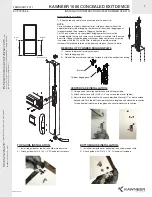
©Copyright Task Force Tips, Inc. 2011-2013
LIG-012 April 9, 2013 Rev02
9
4.5 FLUSH CONTROL
Small debris passes though the debris screen and may get caught inside the
nozzle. This trapped material will cause poor stream quality, shortened reach,
and reduced fl ow. To remove small debris, the nozzle may be fl ushed as follows:
While still fl owing water, rotate the selector ring counterclockwise (as viewed
from behind the nozzle) to the fl ush position. Rotate the selector ring out of
fl ush to continue normal operations. The nozzle operator must be prepared for
a change in nozzle reaction when going into or returning from fl ush.
WARNING
Large amounts or pieces of debris may be unfl ushable and can reduce the fl ow of the nozzle
resulting in an ineffective fl ow. In the event of a blockage, it may be necessary to retreat to a
safe area, uncouple the nozzle and remove debris.
5.0 NOZZLE CONTROLS
5.1 FLOW CONTROL
5.1.1 LEVER TYPE FLOW CONTROL
ON
OFF
On models that use a lever type valve handle, the nozzle is shut
off when the handle is fully forward. The valve handle has 5
detented fl ow positions. These detent positions allow the nozzle
operator to regulate the fl ow of the nozzle depending on the need
or what can be safely and effectively handled. TFT recommends
the use of a pistol grip for easier handling. For additional stress
reduction, a hose rope or strap may also be used. This permits
more effective use and ease of advancement, while minimizing
strain and fatigue


































